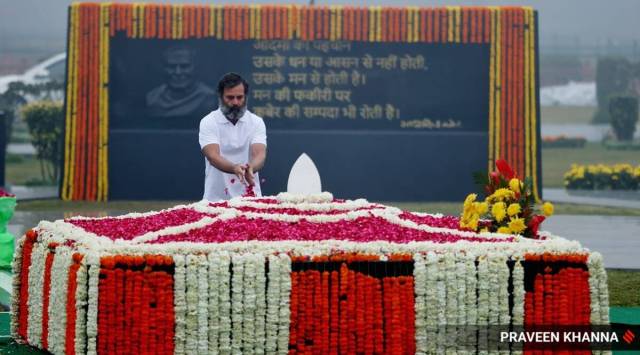
The Bharat Jodo Yatra has added a unique and onerous dimension to public statements and the nature of politics in India. This has been recognised by innumerable thoughtful persons who care deeply for India but may not be formally attached to the Indian National Congress. Through the Yatra, Rahul Gandhi may have added to his public persona a series of political attributes. And, importantly, the cynical political landscape of the country too has undoubtedly found a new narrative. Yet, the ruling BJP remains stuck in trying to find fault with everything about the Yatra — from the clothes of a leader to the gestures of comfort and compassion. It’s also important not to forget its problems and issues with eminent persons participating in this inclusive exercise.
Now, the BJP has tied itself into knots by complaining about Rahul Gandhi paying his respects at Atal Bihari Vajpayee’s memorial. Puerile statements such as “why did he go a day after the anniversary” and “why is he trying to appropriate the legacy of Vajpayee ji” are a symptom of the level to which public discourse has descended.
After a Yatra of 2,800 km, unprecedented in the world, and with Rahul Gandhi amplifying the transformative idea – describing it as a tapasya; a yatra of the people, by the people, for the people – the BJP cannot figure out what it believes is a political strategy to isolate the party. Periodically, it attempts to introduce a contrary note from the sidelines but beats a retreat, overwhelmed by the spontaneous response of thousands of ordinary folk. Then, a minister comes up with unsolicited advice to call off the Yatra because some BJP MPs suddenly had shivers about a Covid-19 variant unleashing chaos. Of course, there is no official protocol issued by the government. And no BJP events are being called off.
It is really surprising that the BJP is now uneasy about someone showing respect for their departed leader who not only made the BJP acceptable to the masses of the country but also stood firm with the idea of “raj dharma”. It is important to understand that for Rahul Gandhi, this is not about appropriating symbols and icons of another party for political gain. It is a true application of the thoughts that he espoused during the Yatra. Although he has been firm about the divisive ambitions of the BJP and the Sangh Parivar, he is careful that his combative spirit and commitment do not engender hate. His purpose is to overcome negativism with love; transform hate into love. The instrument he has chosen is love.
It is interesting that Rahul Gandhi has chosen this path: There is a great deal of symbolism intertwined with a substantive vision. The idea is not to deepen the divide between good and evil, harmony and disarray, anger and accommodation, peace and disquiet, but to reform and assimilate. He wants the divide between “us” and “them” to disappear. He wants a divided nation to heal and unite, to turn frustration and despair into hope and fulfilment. The legacy of Atal Bihari Vajpayee fits this context and thus the visit to his samadhi.
Unlike the present establishment, he believes that the best from all traditions woven into a whole will bring salvation to the poor and the oppressed. There is much in our heritage that we need to preserve and promote, but it would be dishonest to accept that every aspect of our past is flawless and pristine. All civilisations have dimensions of experience that need to be sifted out if humankind is to progress. Slave-like adherence and devotion to everything from the past are dangerous.
Sifting the good from the bad of our past is the quality of statesmanship. In paying respect to the memory of Vajpayee, Rahul has underscored humanism, Bhartiyata, peace and reconciliation that his personality is associated with. The BJP has learnt to win elections, manipulate institutions to gain political advantage and use modern media to create perceptions far from reality. It is time that they discover that the good people from amongst them are appreciated beyond the contours of their party. Where, after all, will we begin to repair the cracks of suspicion and hate that have dominated the politics of our country in recent years?
Atal ji had, in his own inimitable way, tried to do that by conveying the message of “insaniyat, jamhooriyat, Kashmiriyat” to the people of Jammu and Kashmir and took a bus ride to Lahore. That he did not have enough time and resources at his disposal to succeed does not mean that we abandon the effort as we seem to have done. Endless war, even if not of our seeking, cannot be our destiny. Curiously, both to wage a war and to contemplate peace, one has to overcome fear, something that Rahul Gandhi has preached without end. He links fear with hate and thus instead of battling hate in its worst form, he suggests that we eliminate fear to obliterate hate.
The writer is a senior Congress leader and former External Affairs Minister